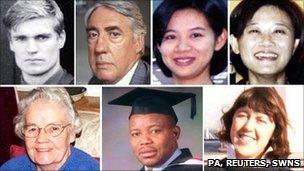Potters Bar inquest jury blames crash on points failure
- Published
Families of those killed say they would like a full public inquiry
A coroner has raised fears over more rail passenger deaths as an inquest jury blamed a points failure for the fatal Potters Bar train crash.
Judge Michael Findlay Baker QC said he would file a report over his concerns.
Seven people died when a train hit faulty points near Potters Bar station in Hertfordshire on 10 May 2002.
After a seven-week hearing, the jury said the points were in an unsafe condition and there had been failures to either inspect or maintain them.
The coroner said he would file a report under Rule 43 of the 1984 Coroners Rules, which would be sent to parties who may be able to act on his concerns.
He said the rule "provides, among other things, that, where the evidence in an inquest gives rise to a concern that circumstances creating a risk of other deaths will continue to exist, and in the coroner's opinion action should be taken to prevent the continuation of such circumstances, that the coroner has power to report those circumstances..."
He added: "Whatever the causes, the passage of over eight years from the derailment to the conclusion of the hearing of the inquest is indefensible.
"The families are due a public apology, and as the current representative of the system whose abuse has led to this delay, I offer that apology.
"It feels wholly inadequate, but it is all that it is within my power to do. I hope a line may begin to be drawn, and a sad and lengthy chapter in many lives may be closed."
A Network Rail spokesman said much had changed since the crash, with private contractors no longer involved in day-to-day maintenance of infrastructure.
'Indefensible'
"Today we remember the lives lost eight years ago. Since then much has changed. The railways are almost unrecognisable," he said.
"All of the recommendations made by both the industry's own formal inquiry and the health and safety investigation have been actioned."
But the Rail Maritime and Transport union said it remained an "absolute scandal" that it had taken eight years to reach this point and get a verdict.
General secretary Bob Crow said: "It at least confirms what we already knew - that this tragic loss of life at Potters Bar could have been avoided if safety rather than profits had been the priority.
"Basic failures of inspection and of maintenance, driven by the greed and fragmentation of rail privatisation, led us to Potters Bar."
The Crown Prosecution Service, meanwhile, said it would consider whether the inquest had thrown up any new evidence. It ruled out criminal proceedings in 2005.
The King's Cross to King's Lynn train crashed as it reached Potters Bar, where it was not scheduled to stop, at about 1300 GMT.
Experts told the inquest the points near the station were "cracked" and "poorly" maintained.
Jurors heard that 10 months before the crash a workman was seen using a hammer and chisel to fix a point at Wood Green, north London.
They were told that a locking nut was missing from a bolt, but the workman failed to replace it.
Instead, the inquest heard, he struck the chisel along the thread of the bolt to try to stop the remaining nut coming unscrewed.
Jurors were also told that three separate reports had been filed about "rough rides" on the northbound approach to the station.
Of the seven people killed, six were passengers - Austen Kark, Emma Knights, Jonael Schickler, Alexander Ogunwusi, Chia Hsin Lin and Chia Chin Wu.
The seventh, Agnes Quinlivan, was hit by debris while walking nearby.
Speaking after the verdict, her daughter Pat Smith said: "We've waited eight long years for this. We all wanted a public inquiry we didn't get.

The families of the victims said the inquest failed to answer key questions
"We've listened to a catalogue of inadequacies and shoddy maintenance and shoddy management systems that should have been rectified a long time ago.
"We hope now they will put them right."
John Knights, 66, the father of 29-year-old victim Emma, said he was disappointed the inquest had failed to let the jury consider "systematic failures".
Nina Bawden, the widow of Mr Kark, added: "I would like to feel that the inquest has served the purpose of leading to improvements in safety on the railways."
Gerry Doherty, leader of the TSSA rail union, said: "The bosses of Jarvis should hang their heads in shame for prolonging the families' suffering by claiming in the immediate aftermath that the accident was down to vandalism.
"This proves once again the folly of rail privatisation whereby the pursuit of profit was placed as a higher goal than passenger safety."
The Office of Rail Regulation said it would now determine whether any criminal proceedings for health and safety offences should be brought.
And the Department for Transport said: "This inquest has allowed for a thorough investigation of the facts surrounding this tragedy in an open forum and we hope that it has enabled the families involved to participate and express their concerns."
The Association of Train Operating Companies, meanwhile, said safety procedures continued to improve but there was no room for complacency.
- Published30 July 2010
- Published30 July 2010
- Published7 July 2010
- Published21 June 2010
- Published3 June 2010
- Published2 June 2010